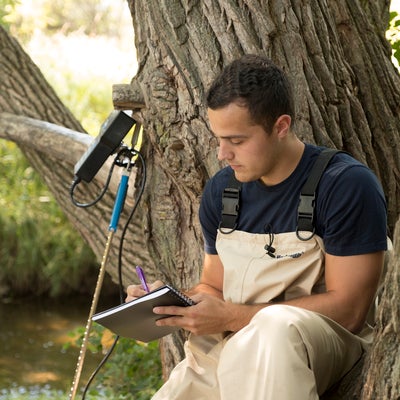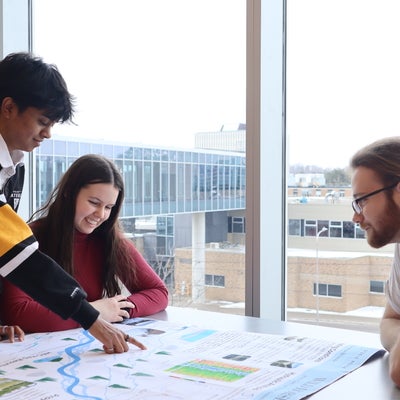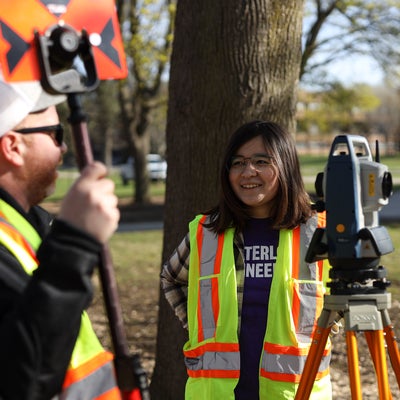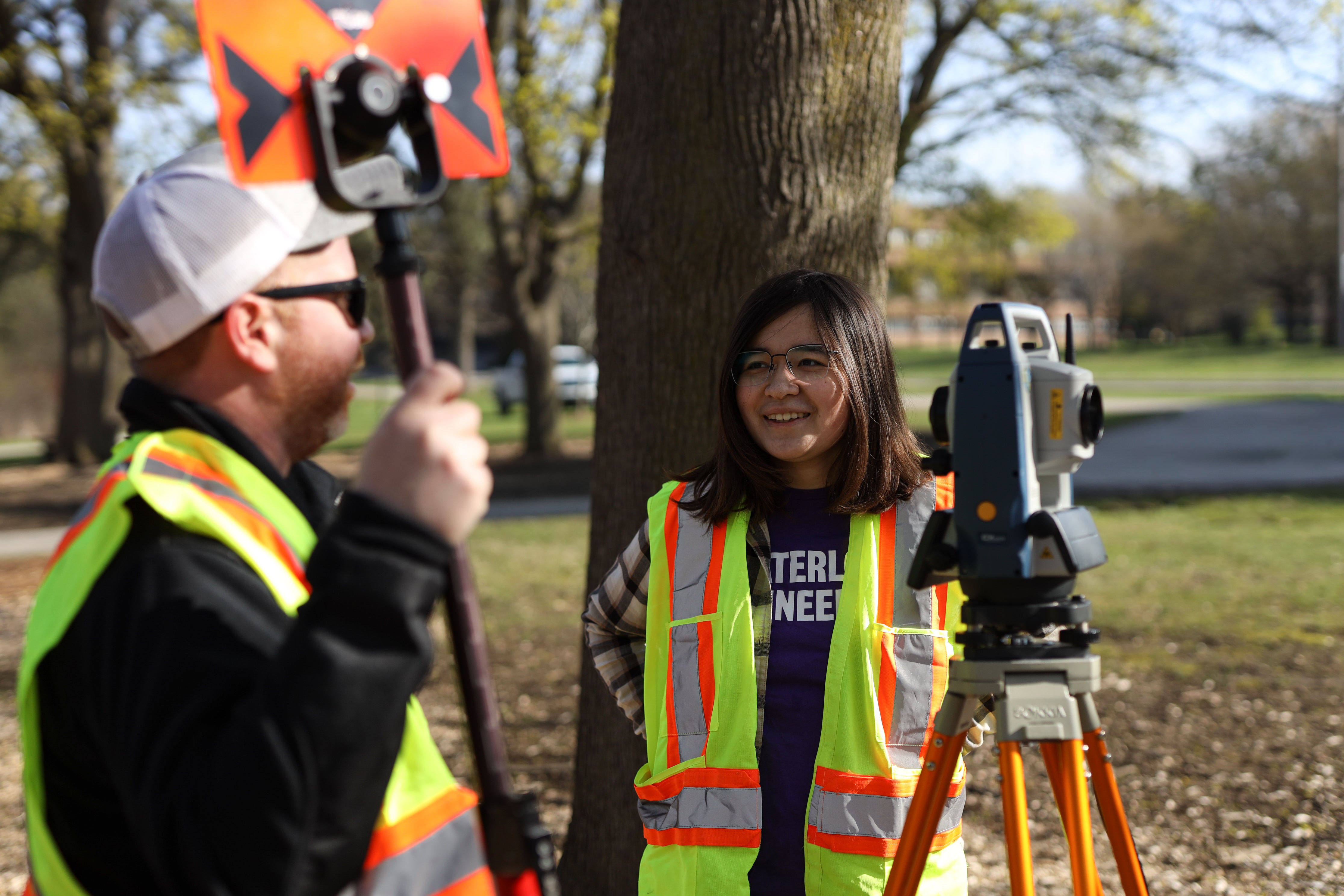Why Environmental Engineering?
Environmental engineers apply fundamental science (chemistry, biology, physics, thermodynamics, mass and energy balance, multiphase flow etc.) and engineering design principles to solve some of the most pressing environmental problems of our time, including problems related to climate change, renewable energy, water scarcity and water and air quality.
We face global crises in climate and biodiversity, and grand challenges in delivering sustainable, resilient and safe infrastructure. In the environmental engineering program, we prepare students to design systems that improve our well-being and protect the natural world. This includes mastering traditional methods to deliver clean air and drinking water, treat wastes and prevent flooding as well as innovating new environmental systems to meet new challenges (like extreme weather, micro-plastics, renewable energy supply and energy from wastes), and planning for a future unlike the past.
Courses in Environmental Engineering
You’ll take a mix of foundational engineering and mathematics courses in first year. After first year, most of your classes will be Environmental Engineering courses covering topics such as environmental chemistry, air quality, biological processes, environmental modelling, water resources and design of water, waste and soil treatment systems.
Sample first-year courses
This is a sample schedule. Courses are subject to change.
| Fall Term (September to December) | Spring Term (May to August) |
|---|---|
Upper year courses
For information about courses past your first year, check out the Undergraduate Academic Calendar.
Customize your degree with specializations and options
Specializations
A specialization is recognition of selected elective courses within your degree. Specialization offerings are unique to your engineering program and are listed on your diploma. Specializations that are available to Environmental Engineering students include:
Energy and Climate Change

Develop expertise in climate change, atmospheric processes, energy systems, sustainable buildings and the environmental and social impacts of energy solutions.
This specialization addresses the challenges of mitigating climate change through energy efficiency, reducing greenhouse gas emissions and ensuring sustainable, resilient infrastructure. It focuses on providing affordable, reliable energy, improving air quality and designing systems that adapt to environmental, economic and social factors.
Water Resources

Explore the physical science of water, its role in human and natural environments, water quantity analysis, GIS and remote sensing and conflict resolution for scarce resources.
This specialization addresses the challenges of water scarcity, climate change, and extreme weather events, such as floods and droughts, that impact water availability and infrastructure. It focuses on ensuring sustainable water distribution, resilient infrastructure, and effective management of water resources in the face of changing environmental conditions.
Pollution and Restoration

Focus on chemical and biological processes for air and water management, treatment strategies and nature-based solutions for ecosystem resilience.
This specialization addresses the challenges of pollution, waste management, and resource depletion by promoting sustainable practices and eco-efficient systems. It focuses on ensuring clean water access, reducing harmful chemicals, and developing resilient solutions for pollution control and resource recovery in the face of climate change.
Modelling and Data Analytics

Build skills in coding, big data, optimization, machine learning and image processing for environmental applications.
This specialization addresses the challenges of managing and analyzing complex environmental data to understand processes and design sustainable systems. It focuses on improving infrastructure resilience, energy efficiency, water management, and urban sustainability through advanced data analytics and modeling techniques.
Sustainable Cities

Study urban infrastructure, transportation, and civil engineering systems, with cross-disciplinary training in urban planning, landscape design and decision-making for sustainable cities.
This specialization addresses the challenges of creating sustainable, resilient cities in the face of climate change, focusing on urban infrastructure, transportation, and environmental systems. It aims to improve land-use planning, manage resources like water and waste, and promote sustainable energy and transport systems to create safe, inclusive urban environments.
Options
Options are a way to provide you with a path to expand your degree and get a secondary emphasis in another subject or area. Options often require taking extra courses beyond your degree's minimum requirements, and may require an extra term of study or overloading semesters. Students should decide if they are interested in taking options as they enter second year. Some available options are:
Co-op for Environmental Engineering students
You’ll have an unrivalled opportunity to gain paid work experience before you even graduate. We’ll help you navigate job applications, résumés, and interviews; you’ll have the added benefit of trying out different roles and/or industries to find the one that fits you while building your work experience and reinforcing your in-class learning out in the real world. It all adds up to a competitive advantage after graduation.
Starting in first year, you'll normally alternate between school and work every four months, integrating your classroom learning with real-world experience. You can return to the same employer for a couple of work terms to gain greater knowledge and responsibility or work for different employers to get a broad range of experience.
| Year | September to December (Fall) | January to April (Winter) | May to August (Spring) |
|---|---|---|---|
| First | Study | Co-op | Study |
| Second | Co-op | Study | Co-op |
| Third | Study | Co-op | Study |
| Fourth | Co-op | Study | Co-op |
| Fifth | Study | Study | - |
Your first work term will be halfway through first year. Learn more about co-op.
Example co-op positions for Environmental Engineering students
- Drainage design engineering assistant
- Environmental engineering assistant
- Technical writer
- Tides and water levels assistant
- Field engineering/project coordination
- Industrial wastewater engineer
- Program developer
2023 Engineering co-op student of the year
Frances Hallen, Environmental Engineering student
By combining her strong analytical skills and desire to solve social issues, Frances was able to make an impact while continuing her learning. As a junior renewable energy developer, Frances demonstrated exceptional collaborative, design and research skills in raising awareness about renewable energy. Her accomplishments include:
- Organizing a solar site visit that included more than 20 employees from across Canada and United States to increase partner support.
- Designing research on the dispersion of acres occupied by corn ethanol, resulting in more than $7000 in social value savings.
- Preparing environmental review presentations to gain political support for EDF’s projects.

Example careers for Environmental Engineering graduates
- Bioremediation expert
- Water resource engineer
- Water project management
- Green building engineer
- Air pollution control system design
- Environmental consultant
- Environmental specialist
- Geomatics analyst
- Renewable energy developer
- Water treatment engineer
Capstone design projects in Environmental Engineering
Capstone Design is the culmination of the engineering undergraduate student experience, creating a blueprint for innovation in engineering design.
Supported by numerous awards, Capstone Design provides Waterloo Engineering students with the unique opportunity to conceptualize and design a project related to their chosen discipline.
A requirement for completion of their degrees, Capstone Design challenges students teams to push their own boundaries, and apply the knowledge and skills learned in the classroom and on co-op work terms. It reinforces the concepts of teamwork, project management, research and development.
For a full list of previous capstone design projects, see our Capstone Design website.
STAMS Consulting Ltd (Capstone 2025)

Omar Al Damen, Meredith Melloul, Hamza Shahzadeh, Sydney Smith, Viraj Thakar
In response to the severe water crisis in Gaza, humanitarian relief is urgently needed to ensure reliable access to clean drinking water. STAMS Consulting presents the Rapid Water Treatment Solution Initiative, deploying innovative, portable, solar-powered desalination units. These units, designed for rapid deployment, provide a reliable and scalable water supply. The initiative aims to improve health outcomes and guarantee access to clean water for displaced communities, transforming the region into a beacon of resilience and hope amidst adversity.
Containment Remediation Association (CRA) (Capstone 2025)
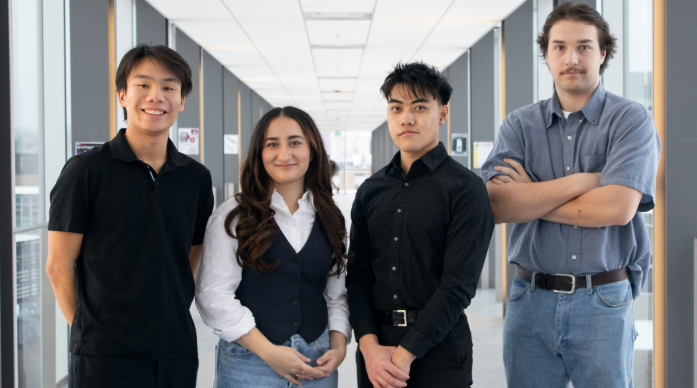
Lukas Hergott, Matthew Kwan, Bryce Lee, Hosna Yadgar
A train derailment occurred on a mountain valley in Alberta, releasing 10,000 gallons of gasoline. The spilled product has infiltrated the soil and groundwater, and is flowing downstream toward the Athabasca River, located at the valley's base. CRA has taken on the task of designing a comprehensive soil and groundwater remediation plan, incorporating biosparging and pump-and-treat techniques. The process was modelled to confirm the effectiveness of our proposed solution.
Student design teams
The Sedra Student Design Centre consists of over 20,000 square feet of space dedicated to design teams and student projects. There are more than two dozen design teams, all of which are student-led, and many of which represent Waterloo internationally.
Some examples include:
Warrior Home

Warrior Home is a multidisciplinary student team that designs and builds high-performing, net-zero energy, affordable, and sustainable homes for community housing organizations.
Midnight Sun

The Midnight Sun Solar Car Team designs, manufactures, and races solar-electric cars capable of travelling on public highways. Their mission is to educate the public and promote innovation in sustainable energy technologies.
UWAFT

UWAFT (University of Waterloo Alternative Fuel Team) continuously breaks new ground in the field of sustainable transportation through innovation, technology, and student engagement.
Environmental Engineering alumni
Iolanda Montagnese

Iolanda (class of 2017), "I enjoyed bouncing between courses and co-op placements every four months as it was a nice balance of both life experience and knowledge."
Read more about Iolanda's time in Environmental Engineering.
Michael Wong

Michael (class of 2019), "I liked working with numbers but wanted to combine that with my passion about the environment and resource management."
Hear more about Michael's time in Environmental Engineering.
Janice Stonebridge

Janice (class of 2015), "I reached out to the team from my last co-op term at the end of my Master's program to see if they would be hiring. And the rest is history!"
Hear more about Janice's time in Environmental Engineering.
Philip Schmidt

Philip (class of 2005), "Waterloo gave me opportunities I never considered, particularly to get involved in really interesting research starting in second year."
Hear more about Philip's time in Environmental Engineering.

